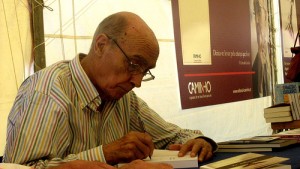
“With a rapid movement, what was in sight has disappeared behind the man’s clenched fists, as if he were still trying to retain inside his mind the final image captured, a round red light at the traffic lights. I am blind, I am blind, he repeated in despair as they helped him to get out of the car, and the tears welling up made those eyes which he claimed were dead, shine even more.” (From Blindness).
Given that his life was so often filled with polemic, perhaps it was fitting that José Saramago’s death should be surrounded by controversy. The late Portuguese novelist would have smiled from the afterlife –if he had believed in it– at the idea of the Vatican and his country’s president being vilified for their response to his passing on June 18.
Yet that is exactly what happened. The author of The Elephant’s Journey and The Year of the Death of Ricardo Reis died peacefully at his home in Lanzarote at the age of 87. But while much of the world mourned the loss of a major writer who was commercially successful despite a dense, experimental style, the Vatican newspaper L’Osservatore Romano published a bitter obituary, describing him as a “populist extremist” and an “anti-religious ideologue”.
The newspaper continued by asserting that Saramago’s “mind has always been anchored to a destabilising attempt to make the sacred banal and to a libertarian materialism which radicalised as the years went by.” L’Osservatore Romano upbraided the avowedly leftist Saramago for losing sleep over the injustice of the Crusades and the Inquisition, while conveniently forgetting the Gulags and other horrors of communism.
This was not the first time the Catholic Church had attacked Saramago. It also reprimanded the Nobel committee for awarding its prize for literature in 1998 to a communist.
While the Vatican’s response to his death drew plenty of opprobrium, many Portuguese were equally outraged at the absence of President Aníbal Cavaco Silva at Saramago’s funeral in Lisbon, where 20,000 admirers filed past his coffin to pay their respects to this child of peasants from the town of Azinhaga. Cavaco Silva, who was holidaying in the Azores, justified his decision by insisting he “didn’t know” the novelist. Saramago himself would undoubtedly have preferred the conservative politician to stay away. In 1992, when Cavaco Silva was prime minister, a member of his government withdrew the writer’s The Gospel According to Jesus Christ from the shortlist of novels competing for the European Literary Prize because of its supposedly offensive content. The furious Saramago went into self-imposed exile in Lanzarote, citing censorship.
Yeats’ assertion that Ireland was a place of “much hatred, little room” would have resonated for Saramago as he contemplated his own country. A strident atheist-communist, especially one who sold millions of books, was bound to stir up deep feelings in Catholic, post-dictatorship Portugal. Nor was there enough room for more than one international literary giant in the country: when a journalist called up rival novelist António Lobo Antunes to ask his opinion of Saramago’s Nobel Prize, he pretended the phone wasn’t working and hung up.
“We can’t accept truth from others”
And yet, the Vatican is wrong to label Saramago an unthinking dogmatist, steered purely by Marxist theory. Like fellow Nobel laureate Harold Pinter, sometimes his views were so angrily radical that they tipped into caricature or prejudice (his more extreme diatribes against Israel drew charges of anti-Semitism). But he was also capable of examining his own convictions with admirable detachment. In 2003, following Cuba’s execution of three would-be exiles who tried to hijack a boat, he publicly withdrew his support for the Castro regime, which he had backed for over four decades, for having “cheated my dreams”.
In one of Saramago’s starkest declarations of intent, he told critic and journalist Maya Jaggi in 2008: “We can’t accept truth coming from other people. We must always be able to question those truths.”
One El País reader, a self-described “Catholic”, wrote recently in defence of the writer from the Vatican’s attack: “Saramago didn’t believe in God, and he substituted morals for ethics; he was a consistent man of solidarity, and as far as I could see he was exemplary throughout these difficult and cruel times that we live in, which have been so full of murder and theft; he was a man of humility and integrity.”
In his novel Blindness, Saramago imagines a world in which people are struck by a mystery virus that robs them of their sight. Like so many of his books, it is a fantastic premise that allows him to explore moral issues without resorting to dogma; in this case it looks at the relationship between the haves and the have-nots. The novelist said of the book: “With the collective catastrophe of total blindness, everything surfaces – positive and negative. It’s a portrait of how we are….who has the power and who doesn’t; who controls the food supply and exploits the rest”.
Perhaps the Catholic Church and Cavaco Silva will one day rue their own blindness when it comes to their treatment of the Godless, but highly moral, José Saramago.
Leave a Reply
You must be logged in to post a comment.